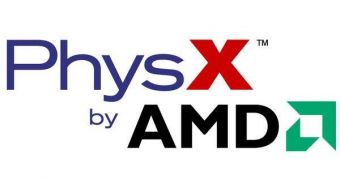The chess game played by Intel and AMD has extended not only over the x86 processor market, but also in the video and gaming sectors. Back in September, Intel finished the Havok takeover, fisting the entire gaming industry under the belt. AMD considered that it would be time to send the heavy artillery back on the battlefield, and made public the intention of taking over Ageia.
Ageia is the main competitor for Havok in physics engine and middleware for video games development. The company produces both the PhysX software, freely available and the PhysX dedicated physics processing unit (roughly $200 per unit). What prevents the solution from penetrating the market is the fact that the hardware is not widely supported in games.
Despite the "unfortunate" games-support, the PhysX software is free and therefore popular, even if the PhysX dedicated physics processing unit itself isn't supported. AMD has repeatedly considered taking over the Ageia business, as it's the only way to stay alive in the gaming physics arena after the communications between AMD and Havok have been cut down.
Regarding this acquisition, AMD's head of developer relations, Richard Huddy, confirmed that "we've had that discussion, yes. It's a discussion that goes round every three months - someone turns to me and says 'why don't we buy Ageia?' and I go through the arguments about why we should and why we shouldn't".
Huddy also declared that the only impediment in taking over Ageia's business is money. Intel valued Havok at rough price of $100 million, which now works in favor of Ageia as sole competitor. "If Ageia want to command a comparable price,' said Huddy, 'then that's a pretty significant problem for AMD. No one would think of us as cash rich at the moment, so splashing an extra $100 million just to get physics, which is a niche market, is quite an issue for us".
Frankly, Ageia doesn't have Havok's shine, nor its financial value. Ageia won't let go easily, since AMD is not the sole company to take interest in physics processing. Nvidia is in the same position as AMD and the first to acquire it will pave its way to - even a temporary - gaming sector supremacy.

 14 DAY TRIAL //
14 DAY TRIAL //